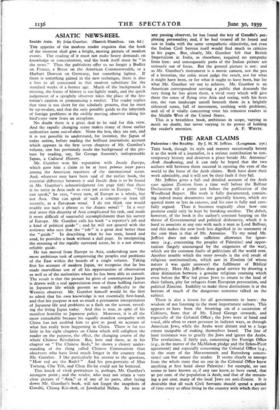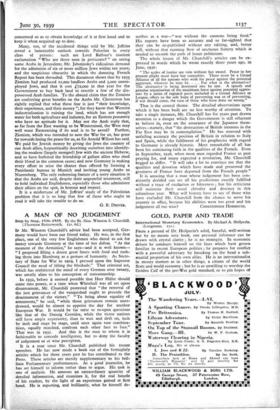THE ARAB CLAIMS
Palestine : the Reality. By J. M. N. Jeffries. (Longman:. 25s.) Tins book, though its style and manner occasionally betray it as the work of a journalist, is a serious contribution to con- temporary history and deserves a place beside Mr. Antonius' Arab Awakening, and it can only be hoped that the two authors will between them succeed in opening the eyes of the world to the force of the Arab claims. Both have done their work admirably, and it will not be their fault if they fail.
Mr. Jeffries gives a full and detailed account of the Arab case against Zionism from a time well before the Balfour Declaration till a point just before the publication of the Woodhead Report. His work is fully documented, contain- ing indeed many documents not generally known, which are quoted more or less in extenso, and his case is fully and care- fully argued. Thus it becomes tragically clear how one promise could only be kept by breaking another. The defect, however, of the book is the author's constant harping on the theme of Governmental and political dishonesty, which it is hard to associate at any rate with such a man as Lord Balfour, and this makes the new book less dignified in its statement of the case than is that of Mr. Antonius. To my mind Mr. Jeffries does not make sufficient allowance for ignor- ance (e.g., concerning the peoples of Palestine) and oppor- tunism (largely encouraged by the exigencies of the war), which are the common faults of politicians all the world over. Another trouble which the story reveals is the evil result of religious sentimentalism, which saw in Zionism (of whose nature it was quite unaware) the fulfilment of Biblical prophecy. Here Mr. Jeffries does good service by drawing a clear distinction between a genuine religious yearning which even before the War led pious Jews to return to the land of their fathers, pity for refugees from European persecution, and political Zionism. Inability to make these distinctions is at the bottom of much of the dangerous nonsense talked on the subject.
There is also a lesson for all governments to learn: the wisdom of not listening to the most importunate suitors. This appears to have been the besetting sin of a succession of Cabinets, from that of Mr. Lloyd George onwards, and especially of the Colonial Office ; the Jews were at hand and vocal, able often to exert pressure in indirect ways, as through American Jews, while the Arabs were distant and to a large extent incapable of making themselves heard. The line of least resistance was to gratify the Jews and ignore the Arabs. The revelations, if fairly put, concerning the Foreign Office (e.g., in the matter of the McMahon pledge and the Sykes-Picot agreement) and especially concerning the Colonial Office (e.g., in the story of the Mavrommatis and Rutenberg conces- sions) can but amaze the reader. It seems dearly to emerge from the whole story that no one in the Colonial Office knew anything at first hand about Palestine : for example, no one seems to have known or, if any one knew, to have cared, that 91 per cent. of the population is Arab, and that of the remain- ing 9 per cent. many of the local Jews are anti-Zionist. It is desirable that all such Civil Servants should spend a period of time every so often living in the country with which they are
concerned so as to obtain knowledge of it at first hand and to keep it when acquired up to date.
Many, too, of the incidental things told by Mr. Jeffries reveal a lamentable outlook towards Palestine in every
class of person: such are Lord Balfour's insolent exclamation " Who are those men in petticoats? " on seeing some Arabs in Jerusalem; Mr. Jabotinsky's ridiculous demand for the admission of six or more million Jews within ten years; and the suspicious obscurity in which the damning French Report has been shrouded. This document shows that by 1935 Zionism had produced ri,000 landless Arabs and 5,000 unem- ployed Jews, and that it cost £72,00o in that year for the Government to buy back land to resettle a few of the dis- possessed Arab families. To the absurd claim that the Zionists are conferring great benefits on the Arabs Mr. Chesterton has rightly replied that what these fear is just " their knowledge, their experience, and their money "; for they know that Western industrialisation is ruining the land, which has not enough water for both agriculture and industry, for an Eastern peasantry who have no aptitude for it. May not the Arab reply that, so far from the East wanting to be Westernised, the West may well want Easternising if its soul is to be saved? Further, Zionism, which was intended to save the War for us, has gone far towards losing the peace for us, as Sir Arnold Wilson has said. We paid for Jewish money by giving the Jews the country of our Arab allies, hypocritically deceiving ourselves into identify- ing the modern (largely mongrel) Jew with the ancient Hebrew, and so have forfeited the friendship of gallant allies who shed their blood in the common cause; and now Germany is making every effort to seize the chance thus offered by forming a Panislamic bureau in Munich and inviting young Arabs to Nuremberg. The only redeeming feature of a sorry situation is that the Arabs are said, despite their ungrateful treatment, still to hold individual Englishmen, especially those who administer their affairs on the spot, in honour and respect.
It is a misfortune of Mr. Jeffries' study of the Palestinian problem that it is so long that few of those who ought to read it will take the trouble to do so.
G. R. DRIVER.











































 Previous page
Previous page